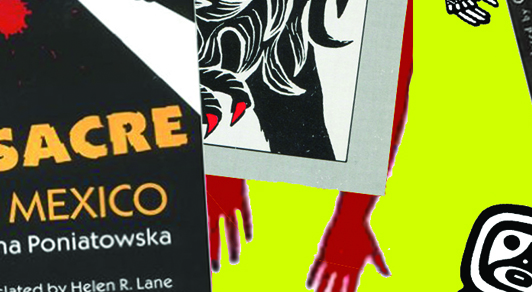
- This event has passed.
Latin America: Colonized and Post-Colonial Attempts at Liberation
Thu, February 4, 2016 @ 7:30 PM - 9:30 PM
$95 – $125
Outside Views / Inside Stories:
Indigenous People’s Reading Group
10 more weeks
Our group will really get going on Thursday, January 28 beginning first with Elena Poniatowska’s investigation and Bolaño’s novel on the 1968 massacre at Tlatelolco, setting the stage for the history of Latin America, Mexico in particular.
On Elena Poniatowska’s Massacre in Mexico:
Elena found out about the massacre on the evening of October 2, 1968, when her son was only four months old. Afterwards, Poniatowska went out on the streets in the neighborhood and began interviewing people while there was still blood on the streets and shoes strewn about and women searching for the children who had not come home. The books contains interviews with informants, eyewitnesses, former prisoners which are interspersed with poems by Octavio Paz and Rosario Castellanos, excepts from pre Hispanic texts and newspaper as well as political slogans Massacre in Mexico was the only book published on the subject for twenty years, contradicting the government’s account of the events and the number dead. The government offered her the Xavier Villaurrutia Award in 1970 for the work but she refused it.
On the Tlatelolco massacre, Poniatowska achieves two things. One, is that she documents the utter chaos of the killings. Second, she makes clear the immense level of organization there was to the killings. Lets start with the chaos. This comes mostly from the initial reactions of those who were there. There is the anthropologist, Magarita Nolasco, who can’t wrap her head around the amount of blood that is spilled. She uses the word “sticky”, and indeed to track the amount of times the word “blood” is used in her account helps that detail “stick” in a reader’s mind. Nolasco also notes the indistinguishable bodies piling up, how she thought any one of them might be her son. Then, there is Jose Ramiro Munoz’s story of his confusion when his friend never returned from the Plaza. One mother, Elvira B. de Concheiro expressed how dumbfounded she was when the helicopter began firing-like in a movie. She stated, “I wandered around in a daze….until finally someone grabbed me by the arm and stopped me”
John Schultz, University of Wooster
Roberto Bolaño’s Amulet embodies in one woman’s voice the melancholy and violent history of Latin America. It begins: “This is going to be a horror story. A story of murder, detection and horror. But it won’t appear to be, for the simple reason that I am the teller. Told by me, it won’t seem like that. Although, in fact, it’s the story of a terrible crime.”
The speaker is named Auxilio Lacouture, dubbed “the mother of Mexican poetry”, though her own take is, “I could say I am the mother of all Mexican poets, but I better not”. Tall, thin, blonde, and old enough to actually be their mother, she’s a Uruguayan exile living illegally in Mexico City since the 1960s, lending a maternal hand to those in need (even her forename means Help in Spanish), doing odd jobs for old writers and at the Faculty of Philosophy and Literature.
We will then simultaneously read Galeano’s Open Veins and Fuentes’ Christopher Unborn. In Open Veins of Latin America, Eduardo Galeano analyzes the history of Latin America as a whole, from the time period of the European settlement of the New World to contemporary Latin America, describing the effects of European and later United States economic exploitation and political dominance over the region.
Contrast that a Library Journal review stated, “Well written and passionately stated, this is an intellectually honest and valuable study.” We will address the fact that Galeano was openly critical of his work near the end of his life.
In Christopher Unborn, Carlos Fuentes depicts a dark future for Mexico. It is a story about disaster and survival. The lead character Christopher Palomar, a wonder boy with excellent language skills and total recall, is the narrator who travels through this pessimistic future, where the people still struggle since the last big earthquake in 1985. The novel has a chapter for each of the nine described months of the story, spread out over Christopher’s whole life, as he follows in his parents’ steps, as they try to save themselves in a chaotic country entering into twilight.
“In Christopher Unborn, Carlos Fuentes has imagined the worst for his country’s near future, but he’s done it with so much humor, verve, invention, erudition and baroque whirligig plotting that the result is a vital, hopeful book, a great salvage operation in the trash heaps of Western culture, Spanish literature and Mexican history”
—Suzanne Ruta, NY Times
The Indigenous People’s Reading Group, which has grown from the enthusiastic call for the need of greater understanding of the long history of the peoples of North America. Following an autumn of considering European and Algerian visions of Algeria we will now focus on the Americas this term. This group began following a stirring presentation by Roxanne Dunbar-Ortiz September of 2014 where she introduced An Indigenous People’s History of the United States.
